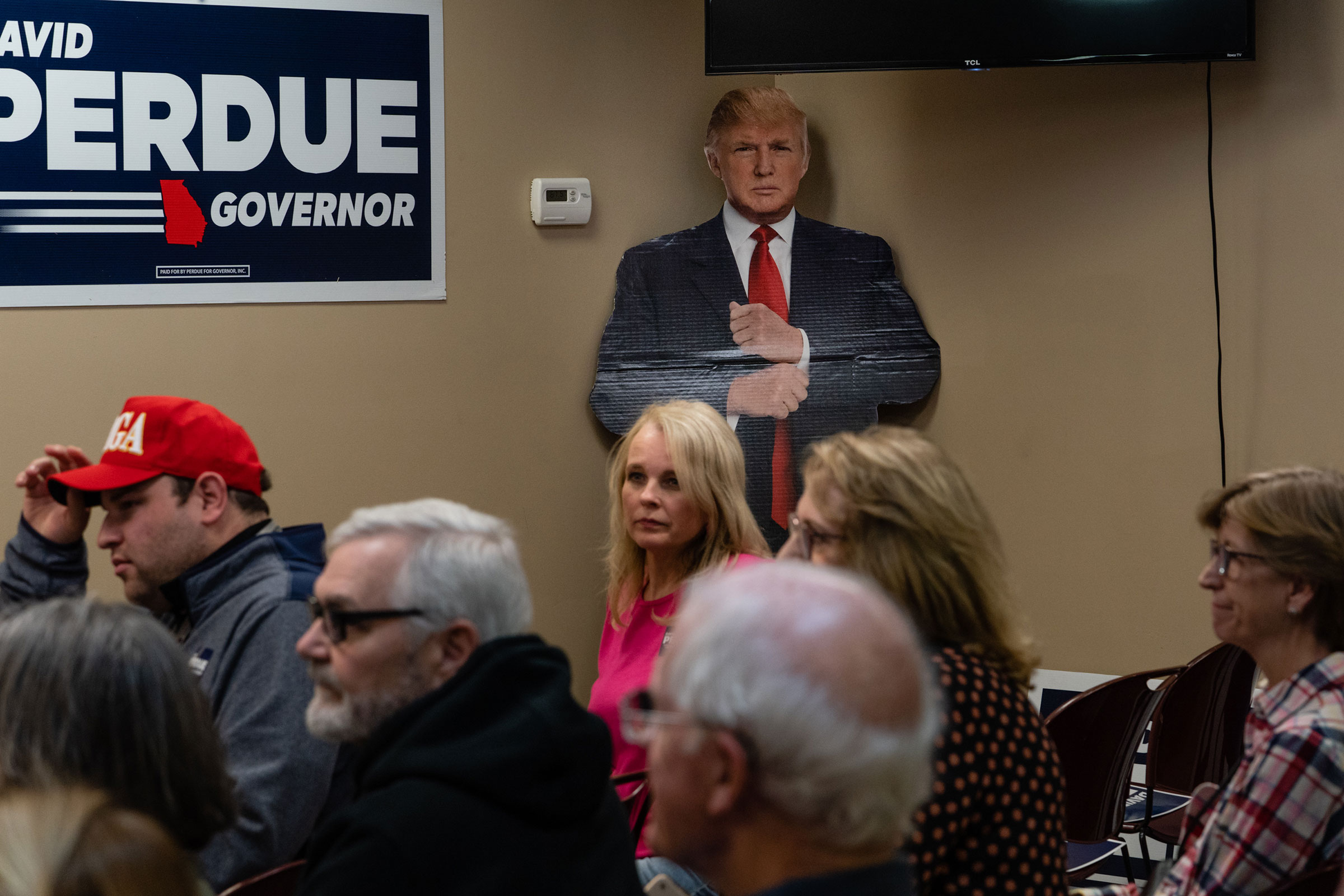
A raft of candidates backed by former President Donald Trump were shellacked at the polls on Tuesday, suggesting his grip on the party may not be as strong as some had thought.
But that doesn’t mean that Republican voters are souring on the former president — just that Trump doesn’t control them.
“A very big and successful evening of political Endorsements,” Trump claimed in a post to his Truth Social account on Wednesday. It was demonstrably not.
It was an especially bad night for the former president in Georgia, where Gov. Brian Kemp, who refused to back Trump’s lie that he won the 2020 election, leads Trump’s hand-picked challenger David Perdue by a massive 52 points. The Georgia Secretary of State Brad Raffensperger, who rebuffed Trump’s demands in a Jan. 2, 2021, phone call to swing the state in his favor, is handily beating Rep. Jody Hice, who Trump endorsed, 52% to 33%. And Trump’s pick for Georgia attorney general also lost in the primary by a wide margin.
Does this portend that Trump has lost favor with Georgia Republicans? Not really. Republicans in the state still love Trump, but don’t feel they have to follow all of his endorsements. (They did back his pick for U.S. Senate, former football star Herschel Walker.) In Georgia, 86% of Republican voters view Trump favorably, according to Morning Consult polling in March, a rating down only 3 points from 89% in January 2021.
In Pennsylvania, Trump’s favorability among Republicans jumped from 72% when he left office to 77% in March, the same set of polling found. But that didn’t translate to an easy victory there in last week’s GOP primary, where Trump’s candidate, Mehmet Oz, is locked in a tight race with David McCormick that is headed to a recount.
Republican voters are showing they can simultaneously support Trump and want to make their own choices for party candidates, in their own states, says Larry Sabato, the founder and director of the Center for Politics at the University of Virginia.
“Even though Trump would have all their votes or the vast majority of their votes if he ran in 2024, that doesn’t mean that he can tell them who to vote for, for their own governor or their own senator or their own congressman,” says Sabato. “Americans are by nature independent and quarrelsome, even within the same party.”
In Alabama’s election on Tuesday, the Republican primary for an open Senate seat is headed to a runoff between Rep. Mo Brooks and Katie Britt. Many political observers assumed Brooks’ campaign was over in March, when Trump decided to strip Brooks of his endorsement because Brooks’s poll numbers were down. Brooks also provoked Trump’s ire when he suggested Republicans should look beyond the 2020 election results and focus on 2022 and 2024.
Brooks said in an interview with MSNBC on Tuesday that his poll numbers went up after Trump reneged on his endorsement, but stressed that he didn’t think Trump’s influence has waned.
“No one has 100% influence,” Brooks said. “There are varying degrees of influence.”
Even after losing Trump’s support, Brooks held on to his “MAGA Mo” campaign slogan and continued to voice his belief in Trump’s lie that the 2020 election was stolen. Brooks spoke at the rally near the White House on Jan. 6, 2021, in which he told the crowd that later breached the Capitol building, “today is the day American patriots start taking names and kicking ass.”
Trump’s mixed results this campaign cycle has prompted his advisors to counsel him to hit the brakes on endorsing in so many races. “He’s gonna slow it down, which may not be a bad thing,” said a former aide to Trump still in touch with Trump’s inner circle. Several former aides to Trump have used their access to introduce their paying political clients to him and convince him to back them, a move that can leave Trump “holding the bag” when those candidates lose, the former aide says. But the aide predicted that the impact on his base’s support for Trump was minimal. “They don’t hold it against him.”
Nonetheless, Trump’s rivals are taking note of how his hold on the base is not absolute. Former Vice President Mike Pence, former Gov. Chris Christie of New Jersey and Gov. Ron DeSantis of Florida are all likely to be emboldened by the mixed results, and perhaps see an opening to challenge Trump for the Republican presidential nomination in 2024. “The weakness he’s displaying, if you want to interpret it as weakness, will encourage Pence and DeSantis and ‘fill in the blank’ to challenge him,” Sabato says. That’s an opening of Trump’s own making.
More Must-Reads from TIME
- Donald Trump Is TIME's 2024 Person of the Year
- Why We Chose Trump as Person of the Year
- Is Intermittent Fasting Good or Bad for You?
- The 100 Must-Read Books of 2024
- The 20 Best Christmas TV Episodes
- Column: If Optimism Feels Ridiculous Now, Try Hope
- The Future of Climate Action Is Trade Policy
- Merle Bombardieri Is Helping People Make the Baby Decision
Contact us at letters@time.com